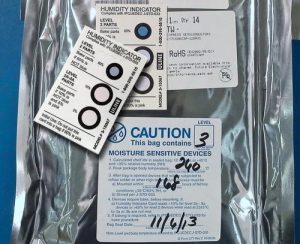
“Popcorning” is the term used when an IC cracks during the reflow process due to the expansion of trapped moisture. This can lead to immediate board failure or latent defects, which often rear their ugly head in the field. Removing the moisture is fairly easy to do, but it can be difficult to implement a successful program. Here are 10 often misconceived tips to avoid your production line from a halting.
The following “Top Ten” list was provided to SMTA, courtesy of Cogiscan and is intended to dispel certain misconceptions related to MSD control in electronics assembly.
- In general, quality and process engineers in the PCB assembly industry have a number of misconceptions about MSD control, because they have not been formally trained on the most recent industry standards.
- A sealed dry bag with desiccant does not require high vacuum. A simple heat seal with the proper quantity of desiccant is sufficient. High vacuum can actually be detrimental by increasing the amount of moisture diffusion through the bag.
- The bag seal date and the 12 months minimum shelf life is not an expiration date. The decision to bake components is strictly based on the status of the humidity indicator card when the bag is opened.
- The clock of exposure time does not always stop when previously exposed components are returned to dry storage (dry cabinet or dry bag).
- Components that have never been exposed and get stored in 10% RH dry cabinets may have a limited storage life and exceed their critical level without ever being exposed to ambient conditions.
AERI bakes our orders without charge for any customer that requests it. Please let your search expert know if your company would like its parts baked when received out of moisture range.

- The default bake cycles have been significantly increased from 24 hours to 48 hours at 125C, and from 8 days to 79 days at 40C. A table is provided in the IPC/JEDEC standard J-STD-033A to reduce the bake cycle according to the physical parameters of each component (MSL and body thickness). To avoid degrading solderability there is a cumulative limit of 48 hours at 125C.
- The floor life clock is not reset by reflow. Assemblers must track the remaining floor life of MSDs assembled on boards for double-side reflow and rework.
- When factory ambient conditions exceed 30C / 60% RH, the floor life indicated on the MS label is no longer applicable. In this case the floor life must be de-rated.
- Boards must be baked prior to rework to avoid damaging moisture sensitive components during localized reflow. The default bake cycle for populated boards is 10 days at 90C.
- Many internal procedures within organizations are based on obsolete industry standards, such as the IPC-SM-786A and JESD22-A112. These documents have been superseded by the joint IPC/JEDEC standard J-STD-033A released in 1999 and revised in July 2002.
Robb Hammond is the President of AERI and the former chair of the Aerospace Industry’s Counterfeit Electronic Components Mitigation Standard for independent distributors, AS6081, which has become one of the industry’s most respected documents, as well as being adopted by the Department of Defense. Robb is one of the foremost thought leaders in the industry on counterfeit detection and speaks regularly at conferences around the globe.


